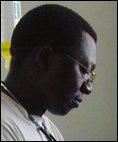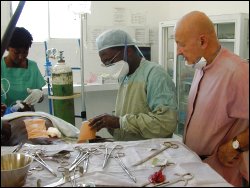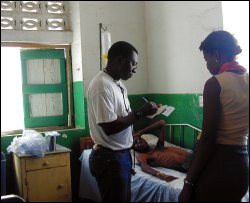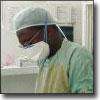Forty-year-old Dr. Albert Tshiula headed MSF's Emergency Response Team in DR Congo after several years as a national staff physician. He has been field coordinator for the MSF program in St. Marc, Haiti.
|

|
The coastal town of Saint-Marc, home to some 50,000 people, is a breathtaking two-hour drive from the Haitian capital along a coastline sloping into a turquoise sea. In early February the town was taken by rebels and quickly retaken by the police. In the weeks since President Jean Bertrand Aristide fell from power, repeated power shifts have left the city plagued by insecurity and political instability.
"Haiti Chéri, Haiti Fâché," (Beautiful Haiti, Angry Haiti) said MSF's Dr. Albert Tshiula, modifying the traditional proverb, Haiti Chéri, Haiti Joyeux (Beautiful Haiti, Joyful Haiti) to better describe the current situation. His meaning is clear: Haiti has all the ingredients of a Caribbean paradise, but has been turned into a nightmare by endless political turmoil. In its 200 years of independence, Haiti has had no less than 35 coups d'état.
As the car drives past some rubble in the street, Dr. Tshiula, a Congolese emergency physician and MSF's field coordinator in St. Marc, points to where, only a few days earlier, the bodies of seven Aristide sympathizers were burned after being slaughtered with machetes.

Dr. Albert Tshiula and Dr. Pierre Gielis assist in the operating theatre of St Nicolas hospital in St Marc, Haiti. Photo © Erwin van der Landt / MSF |
Dr. Tshiula and the Chilean logistical coordinator, Juan José "Paco" Arevalo, are the first MSF members to return to Saint-Marc since they were forced to evacuate the city. Everyday life seems to have returned. Traffic is flowing in the streets, the colourful market is bustling, and banks and other commercial institutions are open again.
Appearances can be deceiving, though. Dr. Tshiula and Arevalo realize there is still anger beneath the surface, and that violence can flare at any moment. There are no authorities in the city - the town is running itself. But for the moment, this power vacuum seems to pose no threat.
"We have much to thank the people here for," Arevalo explains. "Last Sunday, when Aristide stepped down, a group of armed men came to our office in Saint-Marc. They threatened our guard and local logistician at gunpoint. They wanted to take the cars. The negotiations lasted for more than an hour… After a while, several people came to the rescue, persuading the armed men not to take the cars out of respect for the work that MSF is doing. In the end, the men left without taking anything."

Dr. Tshiula consults with a patient. Photo © Erwin van der Landt / MSF |
The team's destination in St. Marc is St. Nicolas Hospital, a 110-bed public health structure and the only reference hospital for the 250,000 people in the region.
In mid-February, MSF aid workers took over emergency treatment and surgery in the hospital after violence caused the permanent medical staff to flee. Dr. Tshiula organized rotation duty to ensure 24-hour access to care, and trained the health staff in emergency procedures.
Two weeks after the evacuation, the hospital seems empty. There are only a few people in the emergency unit and less than ten patients in the entire hospital. There are so few patients because most of the permanent medical staff have not yet returned, forcing people to seek treatment elsewhere. People with financial means sought help from for-pay clinics or doctors, while those who couldn't afford private care simply stayed home and hoped for the best or received very limited basic care at the hospital.
"The insecurity and absence of medical staff halved the number of people attending the emergency unit in the hospital," says Dr. Tshiula. "In January, we had 296 patients, but in February we counted only 141 patients, and 27 of them were wounded by bullets."
It takes less than a day to confirm any suspicion that people will start coming in to St. Nicolas now that people see MSF has returned to the hospital: early in the morning there are already eight patients. Tshiula and Arevalo roll up their sleeves and go back to work.




